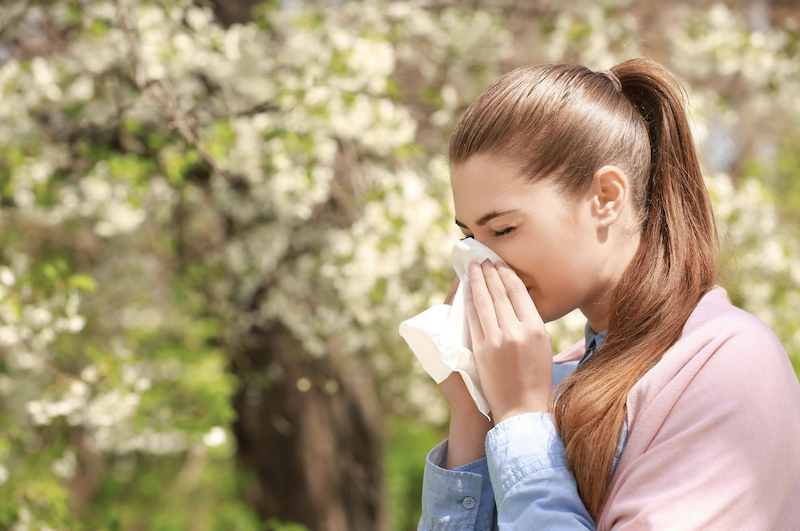Ah spring, that time of the year when the birds chirp, the flowers bloom, and life starts anew. Unfortunately for many people, it also means the start of seasonal allergies, with that pesky yellow pollen being a main offender. Thankfully, you don’t have to hole away inside your home for the next couple months, or suffer through recurrent sinus infections. Acupuncture provides a way to effectively treat and prevent seasonal allergy concerns.
In Chinese Medicine, allergies are considered to be a result of an external “wind” pathogen that is combining with “cold” or “heat” and invading your body. This invasion blocks the flow of what is called Defensive Qi, or wei qi. This type of energy is like a shield that surrounds us and protects us from invaders, whether it’s pollen, colds, flus, or even COVID-19. If you have seasonal allergies, it means that your Defensive Qi has likely been compromised, causing either a condition of “fullness” or “deficiency.” This blockage of Defensive Qi causes symptoms of runny nose, congestion, swelling, sneezing, allergic eczema, and/or conjunctivitis.
The acupuncturist will also look at the state of energy flow in your lung, skin, mucous membranes, and other meridians (energy pathways) such as the large intestine, stomach, and spleen, and design a treatment plan to ensure proper movement of qi throughout the system. Treatment of imbalances in either the Defensive Qi or energy pathways can be done in a variety of ways, including needles, cupping, and gua sha (rubbing the skin with a stone tool to move and release stagnation in the body).
Typically, an acupuncturist will need to see you for at least six treatments to significantly reduce your seasonal allergy concerns. Treatments can be done in a preventative manner, where a patient can receive treatments in the summer to prepare for fall allergies, or the winter to prepare for spring allergies, but they can also be quite useful if you are currently in the throws of congestion, coughing, and/or sneezing.
In addition to receiving acupuncture treatment, it is important to take care of yourself by doing the following:
- Eat a healthy diet. Eating well gives the immune system the best fighting chance, and help you to feel your best.
- Drink enough water. Not only does drinking a sufficient amount of water daily keep your body properly hydrated, but it thins mucus secretions, thus reducing congestion and making symptoms slightly more manageable.
- Get some Vitamin D. Research has shown that Vitamin D can help allergies by working in a variety of ways, including possibly even on an epigenetic level. Epigenetics is a fascinating field that has recently exploded, and it looks at how your environment, behavior, and choices affect how your genes actually work- which genes get turned on or turned off based on how you live your life. From April through October where we live, you can get sufficient Vitamin D by going outside for 15 minutes without sunscreen. If your allergies are severe, you can use a mask when you go outside, or you can take a Vitamin D supplement until your symptoms are better under control.
- Drink tea or warm water with a teaspoon of local honey. This can improve allergies by gently challenging your immune system; to have beneficial effects on allergies, it must be honey that is specifically local to this area, and the closer to where you live, the better.
It is possible to manage your seasonal allergies in a natural and easy way. Our beautiful area has so many amazing outdoor activities, from hiking to kayaking to enjoying the lakes. Make this season the one you take action to get your allergies under control and get back outside!
Note: This article was originally published in a local magazine for their April 2022 issue. For citation references, please contact Dr. Yocum at https://jenyocum.com/contact/


Recent Comments